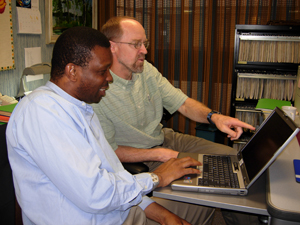 |
Jonathan Vennerstrom, Ph.D., right, talks with Solomon Nwaka, Ph.D., manager of genomics and discovery research, World Health Organization, about his work in antimalarial drugs. Dr. Vennerstrom’s research recently was noted by billionaire Bill Gates in a speech to the United Nations. |
Gates was among representatives from governments, foundations, businesses and civil society groups who met with the UN to discuss the “United Nations Millennium Development Goals,” which focus on slashing poverty, hunger and disease by 2015.
During his talk, the Microsoft founder mentioned a UNMC researcher’s anti-malarial drug development project when discussing great medical advances being made by present-day scientists.
“In early animal studies, a single dose of this drug cured malaria — something we’ve never seen before,” Gates said, referring to a UNMC project funded by Medicines for Malaria Venture (MMV), a nonprofit organization based in Geneva, Switzerland.
The MMV receives 60 percent of its funding from the Bill and Melinda Gates Foundation. The MMV-funded project is led by Jonathan Vennerstrom, Ph.D., a professor of pharmaceutical sciences in the College of Pharmacy.
“It’s exciting to see our project in the news,” Dr. Vennerstrom said about the Gates mention. “It’s good recognition for MMV.”
Dr. Vennerstrom and his global team of scientists work on saving lives through developing more effective and cheaper malaria drugs. The team — which is composed of scientists from UNMC, Monash University in Australia, and the Swiss Tropical Institute in Basel, Switzerland — has received multi-million dollar grants to develop new antimalarial drugs.
The first drug candidate they developed — a synthetic peroxide referred to as OZ277/RBx11160 — recently completed testing in patients in a phase II clinical trial. The three-institution research team is seeking approval from the U.S. Food and Drug Administration to test the safety of the team’s newest drug candidate, which is referred to as OZ439. They will test the drug in healthy study participants in a phase I clinical trial.
|
|
“It looks much, much better in our experimental data, but you just don’t know what will happen when you test it in humans. We hope this one will turn out to work as well in patients as it seems to work in the lab,” Dr. Vennerstrom said.
Courtney Fletcher, Pharm.D., dean of the UNMC College of Pharmacy, said Dr. Vennerstrom’s work is a significant accomplishment, noting that only about one of every 1,000 compounds that enter pre-clinical testing make it into clinical testing in patients.
“The fight against malaria requires new drugs, and Dr. Vennerstrom, through his success at synthesizing new drugs, is on the front line,” Dr. Fletcher said. “Bill Gates’ recognition is a wonderful tribute to the importance of Jonathan’s work and the hope it may provide to the millions in need of treatment.”
Malaria kills more than 2 million people each year in places such as Africa, Asia, Central and South America, according to the World Health Organization. In addition, an estimated 300 million to 500 million new cases of malaria are diagnosed each year. More than 90 percent of all malaria cases occur in Africa. Also at risk are those who travel to countries where malaria is prevalent.